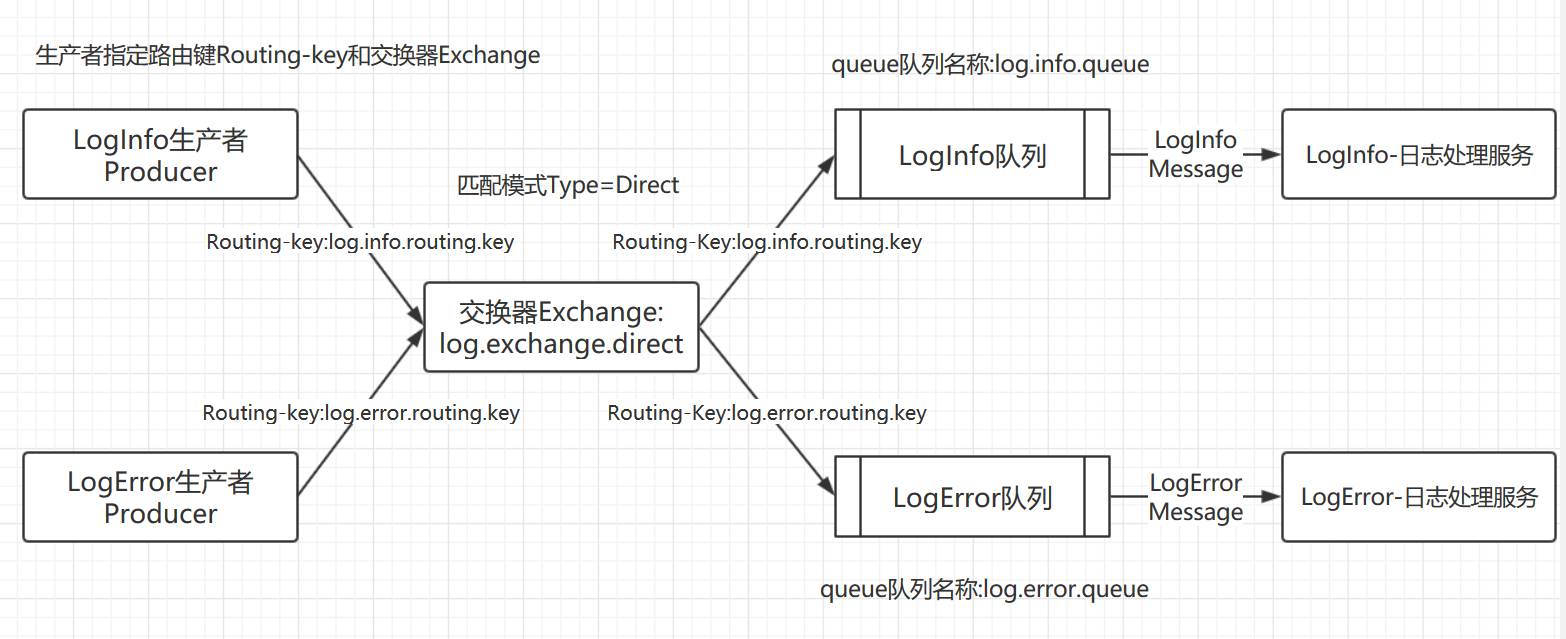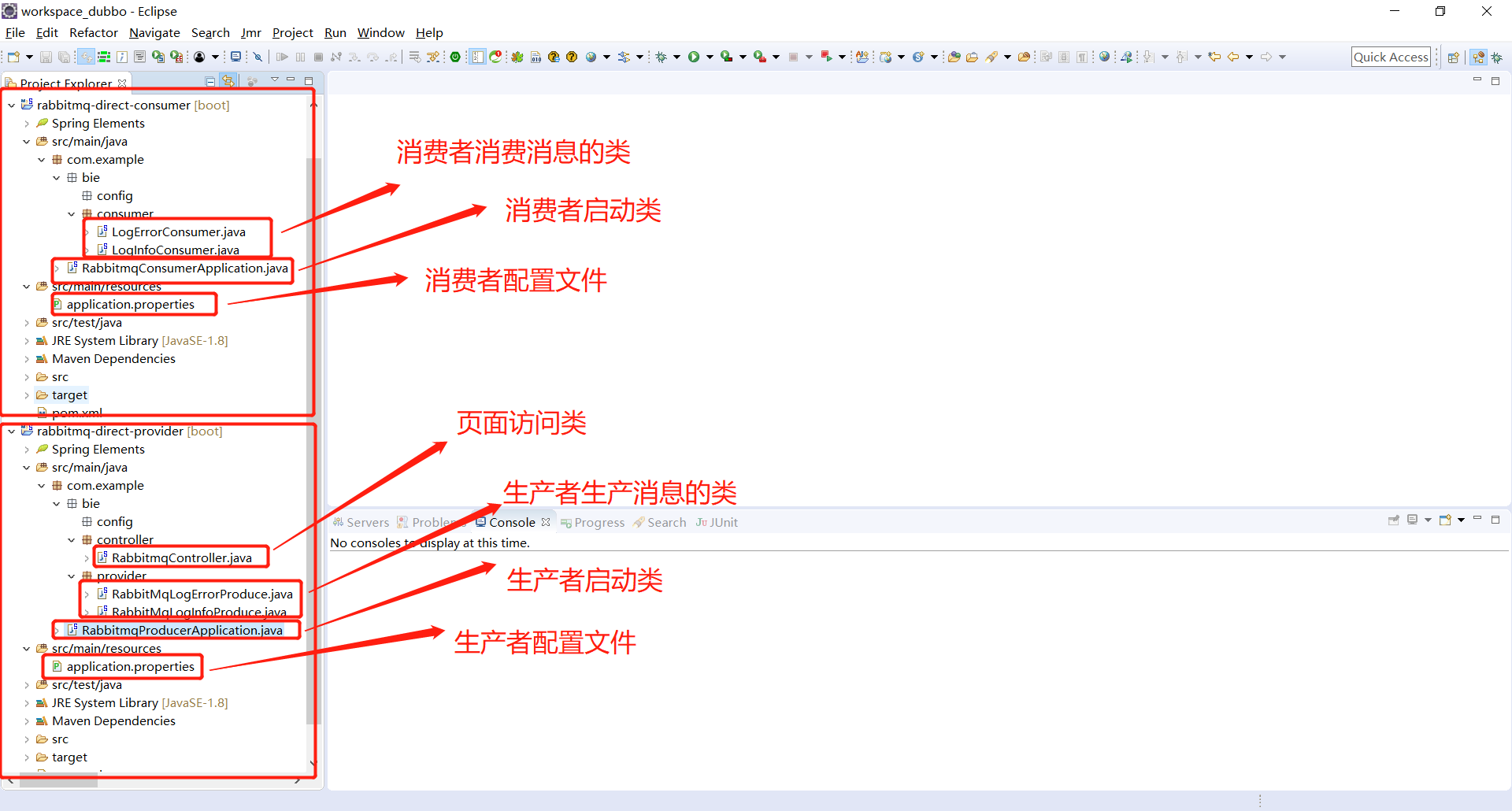RabbitMQ的交换器Exchange之direct(发布与订阅 完全匹配)
1、交换器。用来接收生产者发送的消息并将这些消息路由给服务器中的队列。三种常用的交换器类型,a、direct(发布与订阅 完全匹配)。b、fanout(广播)。c、topic(主题,规则匹配)。
2、direct(发布与订阅 完全匹配)的使用。

由于使用的是SpringBoot项目结合Maven项目构建的。项目工程如下所示:

3、生产者模块和消费者模块分开的,但是pom.xml是一致的,如下所示:
1 <?xml version="1.0" encoding="UTF-8"?> 2 <project xmlns="http://maven.apache.org/POM/4.0.0" 3 xmlns:xsi="http://www.w3.org/2001/XMLSchema-instance" 4 xsi:schemaLocation="http://maven.apache.org/POM/4.0.0 5 https://maven.apache.org/xsd/maven-4.0.0.xsd"> 6 <modelVersion>4.0.0</modelVersion> 7 <parent> 8 <groupId>org.springframework.boot</groupId> 9 <artifactId>spring-boot-starter-parent</artifactId> 10 <version>2.1.1.RELEASE</version> 11 <relativePath /> <!-- lookup parent from repository --> 12 </parent> 13 <groupId>com.bie</groupId> 14 <artifactId>rabbitmq-direct-provider</artifactId> 15 <version>0.0.1-SNAPSHOT</version> 16 <name>rabbitmq-direct-provider</name> 17 <description>Demo project for Spring Boot</description> 18 19 <properties> 20 <java.version>1.8</java.version> 21 </properties> 22 23 <dependencies> 24 <dependency> 25 <groupId>org.springframework.boot</groupId> 26 <artifactId>spring-boot-starter</artifactId> 27 </dependency> 28 <dependency> 29 <groupId>org.springframework.boot</groupId> 30 <artifactId>spring-boot-starter-web</artifactId> 31 </dependency> 32 <dependency> 33 <groupId>org.springframework.boot</groupId> 34 <artifactId>spring-boot-starter-test</artifactId> 35 <scope>test</scope> 36 </dependency> 37 <dependency> 38 <groupId>org.springframework.boot</groupId> 39 <artifactId>spring-boot-starter-amqp</artifactId> 40 </dependency> 41 </dependencies> 42 43 <build> 44 <plugins> 45 <plugin> 46 <groupId>org.springframework.boot</groupId> 47 <artifactId>spring-boot-maven-plugin</artifactId> 48 </plugin> 49 </plugins> 50 </build> 51 52 </project>
配置生产者的配置文件application.properties。配置如下所示:
1 # 给当前项目起名称. 2 spring.application.name=rabbitmq-direct-provider 3 4 # 配置端口号 5 server.port=8081 6 7 8 # 配置rabbitmq的参数. 9 # rabbitmq服务器的ip地址. 10 spring.rabbitmq.host=192.168.110.133 11 # rabbitmq的端口号5672,区别于浏览器访问界面的15672端口号. 12 spring.rabbitmq.port=5672 13 # rabbitmq的账号. 14 spring.rabbitmq.username=guest 15 # rabbitmq的密码. 16 spring.rabbitmq.password=guest 17 18 # 设置交换器的名称,方便修改. 19 # 生产者和消费者的交换器的名称是一致的,这样生产者生产的消息发送到交换器,消费者可以从这个交换器中消费. 20 rabbitmq.config.exchange=log.exchange.direct 21 22 # 生产者生产消息的时候也要带上路由键,队列通过路由键绑定到交换器,交换器根据路由键将绑定到队列上. 23 # 交换器根据不同的路由键将消息发送到不同队列上. 24 # info的路由键. 25 rabbitmq.config.queue.info.routing.key=log.info.routing.key 26 27 # error的路由键. 28 rabbitmq.config.queue.error.routing.key=log.error.routing.key
配置完毕,配置文件开始写生产者生产消息代码。
本模块练习的是发布订阅模式即Direct,分为两个生产者LogInfo、LogError,生产者生产消息的时候也要带上路由键,队列通过路由键绑定到交换器(即交换器根据路由键将绑定到队列上),交换器根据不同的路由键将消息发送到不同队列上。
本项目指定了info的路由键、error的路由键,然后生产者生产的消息发送到指定的交换器。交换器通过路由到绑定的队列中去,最后消费者进行监听队列发生变化,触发指定的方法进行消息的消费。
1 package com.example.bie.provider; 2 3 import org.springframework.amqp.core.AmqpTemplate; 4 import org.springframework.beans.factory.annotation.Autowired; 5 import org.springframework.beans.factory.annotation.Value; 6 import org.springframework.stereotype.Component; 7 8 /** 9 * 10 * @author biehl 11 * 12 * 生产者,生产消息同样需要知道向那个交换器Exchange发送消息的. 13 * 14 * 这里使用的交换器类型使用的是direct发布订阅模式, 15 * 根据配置的路由routing-key来决定,将不同的消息路由到不同的队列queue中。 16 * 不同的消息具有相同的路由键,就会进入相同的队列当中去。 17 * 18 * 19 */ 20 @Component 21 public class RabbitMqLogInfoProduce { 22 23 @Autowired 24 private AmqpTemplate rabbitmqAmqpTemplate; 25 26 // 交换器的名称Exchange 27 @Value(value = "${rabbitmq.config.exchange}") 28 private String exchange; 29 30 // 路由键routingkey 31 @Value(value = "${rabbitmq.config.queue.info.routing.key}") 32 private String routingKey; 33 34 /** 35 * 发送消息的方法 36 * 37 * @param msg 38 */ 39 public void producer(String msg) { 40 // 向消息队列发送消息 41 // 参数1,交换器的名称 42 // 参数2,路由键 43 // 参数3,消息 44 this.rabbitmqAmqpTemplate.convertAndSend(this.exchange, this.routingKey, msg); 45 } 46 47 }
1 package com.example.bie.provider; 2 3 import org.springframework.amqp.core.AmqpTemplate; 4 import org.springframework.beans.factory.annotation.Autowired; 5 import org.springframework.beans.factory.annotation.Value; 6 import org.springframework.stereotype.Component; 7 8 /** 9 * 10 * @author biehl 11 * 12 * 生产者,生产消息同样需要知道向那个交换器Exchange发送消息的. 13 * 14 * 这里使用的交换器类型使用的是direct发布订阅模式, 15 * 根据配置的路由routing-key来决定,将不同的消息路由到不同的队列queue中。 16 * 不同的消息具有相同的路由键,就会进入相同的队列当中去。 17 * 18 * 19 */ 20 @Component 21 public class RabbitMqLogErrorProduce { 22 23 @Autowired 24 private AmqpTemplate rabbitmqAmqpTemplate; 25 26 // 交换器的名称Exchange 27 @Value(value = "${rabbitmq.config.exchange}") 28 private String exchange; 29 30 // 路由键routingkey 31 @Value(value = "${rabbitmq.config.queue.error.routing.key}") 32 private String routingKey; 33 34 /** 35 * 发送消息的方法 36 * 37 * @param msg 38 */ 39 public void producer(String msg) { 40 // 向消息队列发送消息 41 // 参数1,交换器的名称 42 // 参数2,路由键 43 // 参数3,消息 44 this.rabbitmqAmqpTemplate.convertAndSend(this.exchange, this.routingKey, msg); 45 } 46 }
这里使用web工程,浏览器访问调用,方便测试。
1 package com.example.bie.controller; 2 3 import org.springframework.beans.factory.annotation.Autowired; 4 import org.springframework.stereotype.Controller; 5 import org.springframework.web.bind.annotation.RequestMapping; 6 import org.springframework.web.bind.annotation.ResponseBody; 7 8 import com.example.bie.provider.RabbitMqLogErrorProduce; 9 import com.example.bie.provider.RabbitMqLogInfoProduce; 10 11 /** 12 * 13 * @author biehl 14 * 15 */ 16 @Controller 17 public class RabbitmqController { 18 19 @Autowired 20 private RabbitMqLogInfoProduce rabbitMqLogInfoProduce; 21 22 @Autowired 23 private RabbitMqLogErrorProduce rabbitMqLogErrorProduce; 24 25 @RequestMapping(value = "/logInfo") 26 @ResponseBody 27 public String rabbitmqSendLogInfoMessage() { 28 String msg = "生产者===>生者的LogInfo消息message: "; 29 for (int i = 0; i < 100000; i++) { 30 rabbitMqLogInfoProduce.producer(msg + i); 31 } 32 return "生产===> LogInfo消息message ===> success!!!"; 33 } 34 35 @RequestMapping(value = "/logError") 36 @ResponseBody 37 public String rabbitmqSendLogErrorMessage() { 38 String msg = "生产者===>生者的LogError消息message: "; 39 for (int i = 0; i < 100000; i++) { 40 rabbitMqLogErrorProduce.producer(msg + i); 41 } 42 return "生产===> LogError消息message ===> success!!!"; 43 } 44 45 }
生产者的启动类,如下所示:
1 package com.example; 2 3 import org.springframework.boot.SpringApplication; 4 import org.springframework.boot.autoconfigure.SpringBootApplication; 5 6 @SpringBootApplication 7 public class RabbitmqProducerApplication { 8 9 public static void main(String[] args) { 10 SpringApplication.run(RabbitmqProducerApplication.class, args); 11 } 12 13 }
4、生产者搞完以后,开始搞消费者。由于pom.xml配置文件一致,这里省略消费者的pom.xml配置文件。
1 # 给当前项目起名称. 2 spring.application.name=rabbitmq-direct-consumer 3 4 # 配置端口号 5 server.port=8080 6 7 # 配置rabbitmq的参数. 8 # rabbitmq服务器的ip地址. 9 spring.rabbitmq.host=192.168.110.133 10 # rabbitmq的端口号5672,区别于浏览器访问界面的15672端口号. 11 spring.rabbitmq.port=5672 12 # rabbitmq的账号. 13 spring.rabbitmq.username=guest 14 # rabbitmq的密码. 15 spring.rabbitmq.password=guest 16 17 # 设置交换器的名称,方便修改. 18 # 路由键是将交换器和队列进行绑定的,队列通过路由键绑定到交换器. 19 rabbitmq.config.exchange=log.exchange.direct 20 21 # info级别的队列名称. 22 rabbitmq.config.queue.info=log.info.queue 23 # info的路由键. 24 rabbitmq.config.queue.info.routing.key=log.info.routing.key 25 26 # error级别的队列名称. 27 rabbitmq.config.queue.error=log.error.queue 28 # error的路由键. 29 rabbitmq.config.queue.error.routing.key=log.error.routing.key
消费者消费消息的编写,如下所示:
1 package com.example.bie.consumer; 2 3 import org.springframework.amqp.core.ExchangeTypes; 4 import org.springframework.amqp.rabbit.annotation.Exchange; 5 import org.springframework.amqp.rabbit.annotation.Queue; 6 import org.springframework.amqp.rabbit.annotation.QueueBinding; 7 import org.springframework.amqp.rabbit.annotation.RabbitHandler; 8 import org.springframework.amqp.rabbit.annotation.RabbitListener; 9 import org.springframework.stereotype.Component; 10 11 /** 12 * 13 * @author biehl 14 * 15 * 消息接收者 16 * 17 * 1、@RabbitListener bindings:绑定队列 18 * 19 * 2、@QueueBinding 20 * value:绑定队列的名称、exchange:配置交换器、key:路由键routing-key绑定队列和交换器 21 * 22 * 3、@Queue value:配置队列名称、autoDelete:是否是一个可删除的临时队列 23 * 24 * 4、@Exchange value:为交换器起个名称、type:指定具体的交换器类型 25 * 26 * 27 */ 28 @Component 29 @RabbitListener(bindings = @QueueBinding( 30 31 value = @Queue(value = "${rabbitmq.config.queue.error}", autoDelete = "true"), 32 33 exchange = @Exchange(value = "${rabbitmq.config.exchange}", type = ExchangeTypes.DIRECT), 34 35 key = "${rabbitmq.config.queue.error.routing.key}")) 36 public class LogErrorConsumer { 37 38 /** 39 * 接收消息的方法,采用消息队列监听机制. 40 * 41 * @RabbitHandler意思是将注解@RabbitListener配置到类上面 42 * 43 * @RabbitHandler是指定这个方法可以进行消息的接收并且消费. 44 * 45 * @param msg 46 */ 47 @RabbitHandler 48 public void consumer(String msg) { 49 // 打印消息 50 System.out.println("ERROR消费者===>消费<===消息message: " + msg); 51 } 52 53 }
1 package com.example.bie.consumer; 2 3 import org.springframework.amqp.core.ExchangeTypes; 4 import org.springframework.amqp.rabbit.annotation.Exchange; 5 import org.springframework.amqp.rabbit.annotation.Queue; 6 import org.springframework.amqp.rabbit.annotation.QueueBinding; 7 import org.springframework.amqp.rabbit.annotation.RabbitHandler; 8 import org.springframework.amqp.rabbit.annotation.RabbitListener; 9 import org.springframework.stereotype.Component; 10 11 /** 12 * 13 * @author biehl 14 * 15 * 消息接收者 16 * 17 * 1、@RabbitListener bindings:绑定队列 18 * 19 * 2、@QueueBinding 20 * value:绑定队列的名称、exchange:配置交换器、key:路由键routing-key绑定队列和交换器 21 * 22 * 3、@Queue value:配置队列名称、autoDelete:是否是一个可删除的临时队列 23 * 24 * 4、@Exchange value:为交换器起个名称、type:指定具体的交换器类型 25 * 26 * 27 */ 28 @Component 29 @RabbitListener(bindings = @QueueBinding( 30 31 value = @Queue(value = "${rabbitmq.config.queue.info}", autoDelete = "true"), 32 33 exchange = @Exchange(value = "${rabbitmq.config.exchange}", type = ExchangeTypes.DIRECT), 34 35 key = "${rabbitmq.config.queue.info.routing.key}")) 36 public class LogInfoConsumer { 37 38 /** 39 * 接收消息的方法,采用消息队列监听机制. 40 * 41 * @RabbitHandler意思是将注解@RabbitListener配置到类上面 42 * 43 * @RabbitHandler是指定这个方法可以进行消息的接收并且消费. 44 * 45 * @param msg 46 */ 47 @RabbitHandler 48 public void consumer(String msg) { 49 // 打印消息 50 System.out.println("INFO消费者===>消费: " + msg); 51 } 52 53 }
消费者启动主类如下所示:
1 package com.example; 2 3 import org.springframework.boot.SpringApplication; 4 import org.springframework.boot.autoconfigure.SpringBootApplication; 5 6 @SpringBootApplication 7 public class RabbitmqConsumerApplication { 8 9 public static void main(String[] args) { 10 SpringApplication.run(RabbitmqConsumerApplication.class, args); 11 } 12 13 }
5、发布订阅模式,生产者生产消息,消费者消费消息,运行效果如下所示:
首先启动你消费者消费消息的启动类,再启动你的生产者生产消息的启动类。
作者:别先生
博客园:https://www.cnblogs.com/biehongli/
如果您想及时得到个人撰写文章以及著作的消息推送,可以扫描上方二维码,关注个人公众号哦。





【推荐】国内首个AI IDE,深度理解中文开发场景,立即下载体验Trae
【推荐】编程新体验,更懂你的AI,立即体验豆包MarsCode编程助手
【推荐】抖音旗下AI助手豆包,你的智能百科全书,全免费不限次数
【推荐】轻量又高性能的 SSH 工具 IShell:AI 加持,快人一步
· 如何编写易于单元测试的代码
· 10年+ .NET Coder 心语,封装的思维:从隐藏、稳定开始理解其本质意义
· .NET Core 中如何实现缓存的预热?
· 从 HTTP 原因短语缺失研究 HTTP/2 和 HTTP/3 的设计差异
· AI与.NET技术实操系列:向量存储与相似性搜索在 .NET 中的实现
· 周边上新:园子的第一款马克杯温暖上架
· Open-Sora 2.0 重磅开源!
· 分享 3 个 .NET 开源的文件压缩处理库,助力快速实现文件压缩解压功能!
· Ollama——大语言模型本地部署的极速利器
· DeepSeek如何颠覆传统软件测试?测试工程师会被淘汰吗?
2017-11-03 一脸懵逼学习KafKa集群的安装搭建--(一种高吞吐量的分布式发布订阅消息系统)
2016-11-03 PowerDesigner最基础的使用方法入门学习